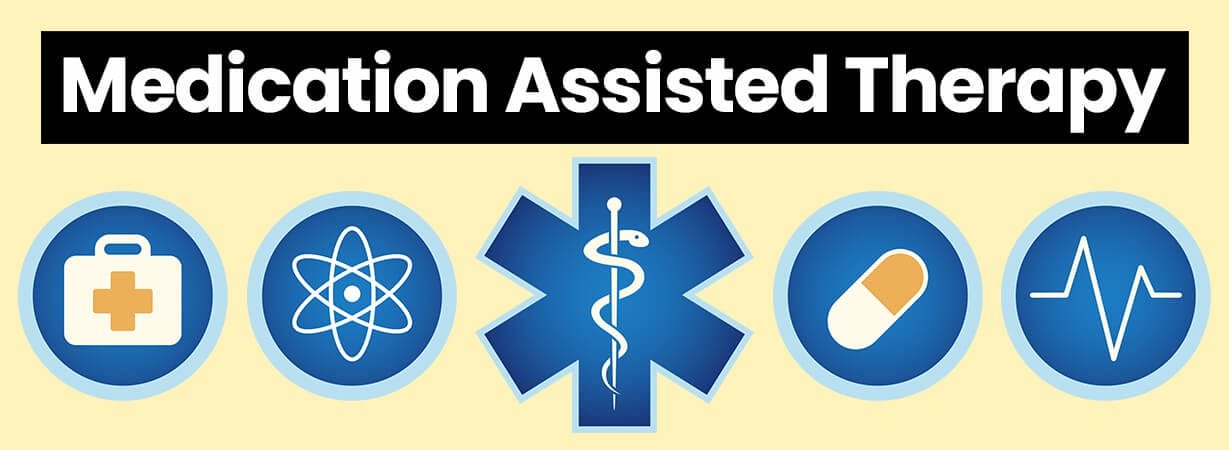Medication Assisted Treatment
Medication Assisted Treatment Therapy
A new advancement in addiction treatment science that is offering promising results in treating drug and alcohol addiction.
Research indicates when treating substance use disorders, a combination of medication and behavioral therapies is most successful. Medication Assisted Treatment (MAT) is clinically driven with a focus on individualized patient care.
Medication Assisted Treatment or Therapy is the use of medications, in combination with counseling and behavioral therapies, to provide a whole-patient approach to the treatment of substance use disorders, usually related to opioid and heroin addiction.
In a recent Huffington Post article featuring President Barack Obama discussing the current heroin and opioid addiction problem, the President said of medication assisted treatment, “Only a small minority of Americans who might benefit from the best treatment are getting it.”
Pharmacotherapy is a new advancement in addiction treatment science that is offering promising results in treating drug and alcohol addiction.
While the practice of pharmacotherapy is not new, the understanding of brain chemistry and how behavior is affected by chemical stimuli continues to advance.
Many scientists and treatment specialists are optimistic that pharmacotherapy can be an effective treatment option, especially when used in a larger, more comprehensive treatment programs.
The practice of Pharmacotherapy is defined as the treatment of disease through the administration of highly advanced prescription drugs. Pharmacotherapy can be used to treat a wide variety of physical and mental health illnesses including schizophrenia, panic disorders, Alzheimer’s disease, as well as many different infectious diseases.
However, in recent years scientists have discovered that pharmacotherapy can be very effective at treating drug and alcohol addiction, while helping patients to reduce cravings during early recovery periods. This form of pharmacotherapy is often known as Medication Assisted Treatment (MAT) and refers to any treatment for a substance abuse disorder that includes pharmacological intervention as part of a larger comprehensive substance abuse treatment plan.

Benefits of Medication Assisted Treatment Therapy
- Increased treatment retention
- Decreased opiate use
- Improved birth outcomes with perinatal addicts
- Decreased criminal activities
- Improved survival rate
- Provide relief for withdrawal symptoms for babies born addicted to drugs
Pharmacotherapy Drugs for Substance Abuse
Treatment specialists have a number of different drugs available to them that can be very effective at reducing cravings and treating various substance abuse disorders. These can include Naltrexone, Acamprosate, and Campral, which are all powerful and effective drugs for treating alcohol dependence and withdrawal. Naltrexone for instance, is an antagonist that blocks receptors believed to interact with alcohol and pleasure centers in the brain.
Acamprosate, on the other hand, interacts with chemicals in the brain that are associated with a sense of anxiety or panic, especially about the absence of alcohol in the body and alcohol withdrawal.
Pharmacotherapy is also very effective at treating opiate disorders and helping to prevent relapse after opiate detox. Medications used for treating opioid dependence include Methadone, Buprenorphine, also known as Buprenorphine / naloxone, and Naltrexone.
Methadone and Buprenorphine / naloxone both work to help alleviate painful symptoms of opiate withdrawal and work as an opiate substitute in the brain. While methadone has been around for a much longer duration, many treatment experts view buprenorphine / naloxone as a safer and less addictive alternative.
How Pharmacotherapy is Applied in Rehab
Pharmacotherapy is used in drug treatment settings in a number of different ways. It may be used to help relieve cravings and withdrawal symptoms of alcohol or opiate related addictions, or may be used to help prevent relapse over the long-term.
Certain pharmacotherapy medications can be helpful in reducing cravings while the patient undergoes a more comprehensive treatment program, while some are used after the treatment program is over to ensure the patient doesn’t relapse down the road.
Doctors using pharmacotherapy methods rely heavily on producing tightly controlled drug treatments, ensuring that dosages are safe and consistent. However, it is important to remember that these powerful and effective drug treatment medications are best used in conjunction with a comprehensive behavioral and cognitive treatment program.
Effects of Pharmacotherapy
Before attempting any of these pharmacotherapy treatment options, it is important to talk to your doctor about any current and past medical issues you may have, as well as any medication you’re currently taking. This is because many of these medications can cause interactions with other prescription drugs, which may cause adverse health effects.
For instance, anyone who suffers from kidney problems should not take the drug Acamprostate, while Naltrexone can be hazardous to anyone with prior liver damage. Because each individual can react differently to these medications, it is important to contact your doctor or treatment specialist immediately if you are having any adverse health conditions.